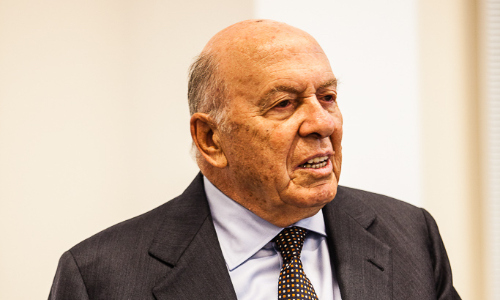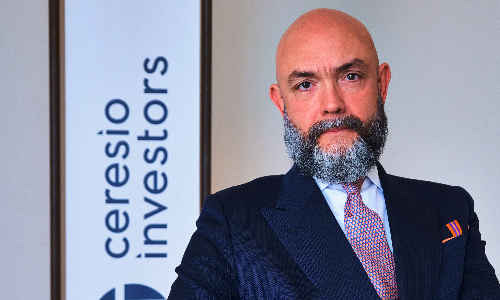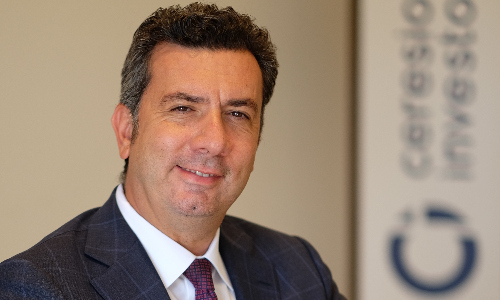George Soros and His Legendary Swiss Sponsor
Founded over 100 years ago, the firm strongly supported the financier George Soros in his early days. Today, the bank is increasingly focusing its advisory services on young entrepreneurs and wealthy families, as finews.asia reports.
The name Ceresio Investors does not immediately suggest a Swiss bank. However, a closer look reveals that there is in fact a financial institution with a long tradition in Lugano: Banca del Ceresio, founded in 1958.
Initially, the company, whose origins in Italy date back to 1919, operated exclusively as a family office that managed the assets of the Milanese Foglia family.
Legendary Sponsor and Friend of George Soros

Alberto Foglia, banker (Image: Jacques Perler)
In the 1960s and 1970s, however, Alberto Foglia, together with his brother Giambattista Foglia, contributed to the bank's prosperity in Ticino in particular: the financier, born in 1928, was a key discoverer and supporter of future hedge fund investor George Soros. The two were not only (business) friends for many years, but Foglia also served first as Chairman and later as Honorary Chairman of Soros' successful Quantum Fund. This relationship contributed significantly to the creation and growth of the Ceresio Bank.
The political turbulences of the 1970s in Italy, together with the depreciation of the lira, ultimately drove Foglia to establish himself permanently in Ticino, where he died at the end of 2021 at the age of 93. The group of companies, with offices in Milan and London, is now in its third generation under the leadership of Foglia's three sons, Antonio, Giacomo and Federico.
Very Discreet
Today, the group of companies, which from 2019 operates as Ceresio Investors, remains very discreet, as Gabriele Corte, General Manager of Banca del Ceresio and Group Executive Board Member since 2018, noted in an interview with finews.asia.

Gabriele Corte, Ceresio Investors (Image: CI)
«The Foglia family still uses the structures of Ceresio Investors today. But if other families want to join us, for instance, because our platform is attractive to them or because the structure of a family office would be too onerous, nothing prevents them from doing so,» Corte continues.
On this basis, Ceresio Investors has relationships with more than 500 families, mainly in Italy, Switzerland, the UK, and Monte Carlo, and manages nearly 9 billion francs in deposit accounts.
Strong Filter For Other Families
In addition to this are assets held fiducially on behalf of clients. «For risk and reputational reasons, we limit our client base to the jurisdictions mentioned,» Corte remarks, «we are very familiar with these jurisdictions and have the necessary networks and control mechanisms in place.»
Besides traditional asset management, which includes a (historical) strong focus on hedge funds, financial planning and structuring, and wealth consolidation for wealthy families, Ceresio Investors is characterized above all by its unique co-investment concept. Each investment is indeed always made in parallel by the shareholder's family, management and clients. This is true for both liquid and private equity investments.
M&A Team From BSI
«This is a strong filter for other families,» Corte emphasizes. With this in mind, Ceresio Investors makes targeted use of its extensive business relationships, particularly in Italy and Italian-speaking Switzerland, for instance, to organize attractive club deals for itself in which interested clients can also invest.
The close connection with entrepreneurial families has led to a broadening of the product range in recent years. «We realized that many companies with annual turnovers of up to 500 million francs are not well served by investment banks,» explains Corte, «especially when it comes to their financing needs or M&A transactions.» With this in mind, Ceresio Investors recruited a team of specialists from the then Banca della Svizzera Italiana (BSI) six years ago under the leadership of Alessandro Santini.
Investing Alongside the Family

Alessandro Santini, Ceresio Investors (Image: CI)
Santini, formerly head of finance at the Florentine fashion company Ferragamo and then head of Corporate Advisory at BSI, is not a typical banker. «He really understands how to get inside the heads of entrepreneurs,» says Corte. «He is direct in his judgments and entrepreneurs appreciate him for not wasting their time.» Meanwhile, Ceresio Investors has already completed more than 30 deals, twelve of which are Club Deals where the Foglia family and management have also invested directly. The focus is on companies in the machinery, financial, services, fashion and food industries.
Even though Ceresio Investors' Corporate Advisory & Investment Banking team is based in Milan, the idea is to operate from Switzerland as well, as Corte explains.
Historically Important Time
«Satisfied entrepreneurs are also more likely to transfer their private assets to us after a successful transaction,» he concludes. The initiative also occurs at a historically important time, as the disappearance of Credit Suisse as an independent bank means the disappearance of a player in Switzerland that previously held an important role in corporate finance, working with corporate clients – especially in Ticino, where the choice of such providers has always been more modest than in the rest of Switzerland.

Credit Suisse at Piazza Riforma in Lugano (Image: CS)
«The disappearance of Credit Suisse is not a good publicity for all internationally active Swiss banks,» says Corte, «because with our banking services, we also sell a piece of Swiss solidity and trust. And when the country's second-largest bank disappears, many clients ask questions,» says Corte, pointing out that the Italian media, for example, have been focusing this year on the dramatic decline of Credit Suisse, echoing the statement: «This is no longer the Switzerland we used to know».
Difficult Times for Southern Switzerland
For Corte, it is clear that the end of Credit Suisse will have a major impact on the Swiss economy, albeit delayed for the time being, since the real effects have not yet been experienced. For Ticino, this development is far from positive, as the number of banks in Italian-speaking Switzerland lending to the economy can be counted on the fingers of one hand.
«Now it is even more important how we can support our local market,» emphasizes Corte. The corporate finance services offered by Ceresio Investors are one possible approach.




















